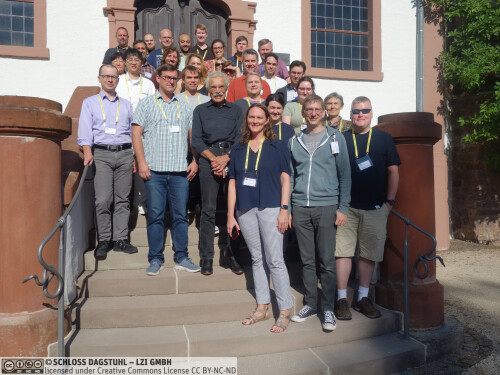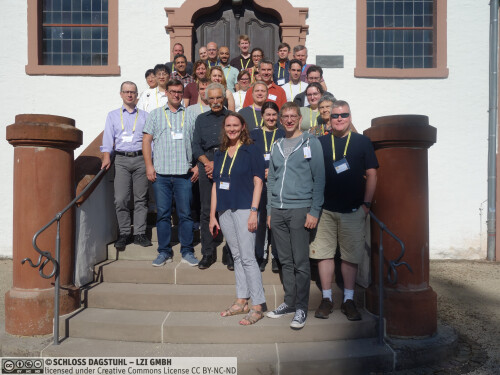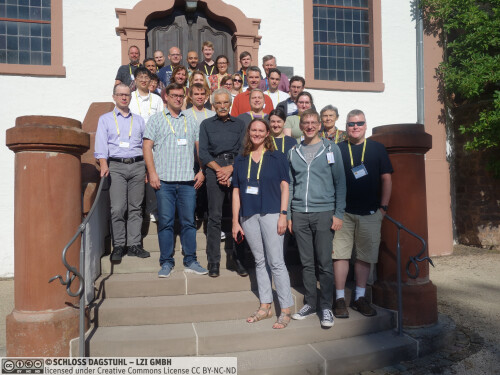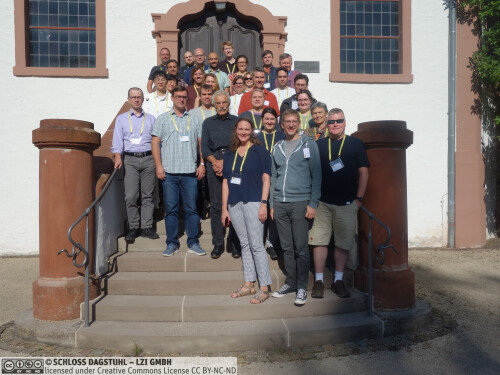Dagstuhl Seminar 25351
Computational Proteomics
( Aug 24 – Aug 29, 2025 )
Permalink
Organizers
- Rebekah Gundry (University of Nebraska - Omaha, US)
- Magnus Palmblad (Leiden University Medical Center, NL)
- Mathias Wilhelm (TU München - Freising, DE)
Contact
- Michael Gerke (for scientific matters)
- Jutka Gasiorowski (for administrative matters)
Dagstuhl Reports
As part of the mandatory documentation, participants are asked to submit their talk abstracts, working group results, etc. for publication in our series Dagstuhl Reports via the Dagstuhl Reports Submission System.
- Upload (Use personal credentials as created in DOOR to log in)
Shared Documents
- Dagstuhl Materials Page (Use personal credentials as created in DOOR to log in)
Schedule
- Upload (Use personal credentials as created in DOOR to log in)
- Dagstuhl seminar: A Generalization of the Coupon Collector Problem, Tobias Schmidt's musings on his variant of the Dagstuhl's Happy Diner Problem in his blog, August 25, 2025.
In proteomics, novel algorithms are drivers of innovation, enhancing extraction of actionable insights from collected data and thereby advancing the field. We have identified three highly interesting computational challenges (and thus opportunities) that have come to the foreground in recent years: First is the application of machine learning in proteomics, which is already contributing to advancements in data analysis and interpretation in areas such as protein identification, functional annotations, and personalized medicine. Second is the rapidly growing field of glycoproteomics, which links to therapeutics as many therapeutic proteins are glycosylated. The focus here will lie on the characterization of the glycan moieties attached to proteins, the analysis of which poses specific computational challenges. Third is a cross-cutting topic at the interface between proteomics and other omics in the context of translational research. This includes both mass spectrometry and new approaches to generate, interrogate, and integrate data related to proteins, their transcripts and related metabolites. These topics are at the forefront of arising technologies and require novel solutions to emerging, highly complex problems.
As different experts need to be brought together to tackle these three topics, this Dagstuhl Seminar is thoroughly interdisciplinary: computer scientists, bioinformaticians, and statisticians, who develop algorithms and software for data interpretation; experimental life scientists that rely on proteomics as a key means to elucidate biology; and analytical chemists and engineers that develop new instruments and approaches to deliver ever more comprehensive and accurate data. Throughout, industry plays crucial roles as instrument and software vendors, and as advanced users driving applications, including in the development of new diagnostics and pharmaceuticals. Industry participation is therefore explicitly included in this seminar.
Attendance will therefore be built from a diverse group of participants, including computational and experimental scientists, and academic and industrial researchers across the three relevant domains of this seminar. The goal is to uncover as-yet unexplored synergies from interactions within and across these various backgrounds; a process which has already proven highly effective and inspiring in previous Dagstuhl Seminars on Computational Proteomics. A strong focus throughout the week thus will be on the free exchange of ideas between participants of different backgrounds to maximally benefit from obvious as well as less obvious synergies and to provide maximal opportunity for cross-fertilisation of ideas. To accommodate this, the seminar structure will be quite flexible, allowing for spontaneous working groups to emerge alongside pre-planned ones, and providing opportunity for any interested participant to start a discussion on any related topic of interest.
This interdisciplinary seminar is therefore poised to enable novel, breakthrough developments in computational proteomics around the three topics. The breadth and interrelatedness of the topics will provide a unique opportunity to bring together experimental, computational, translational, and clinical researchers from academic, government, and industry to come together to develop and inform future solutions in these topics.
 Rebekah Gundry, Magnus Palmblad, and Mathias Wilhelm
Rebekah Gundry, Magnus Palmblad, and Mathias Wilhelm
Please log in to DOOR to see more details.
- Charlotte Adams (University of Antwerp, BE)
- Kiyoko Aoki-Kinoshita (Soka University - Tokyo, JP) [dblp]
- Gad Armony (Bruker Nederland - Leiderdorp, NL)
- Wout Bittremieux (University of Antwerp, BE) [dblp]
- Isabell Bludau (Unviversitätsklinikum Heidelberg, DE) [dblp]
- Robert Chalkley (University of California - San Francisco, US) [dblp]
- Tine Claeys (Ghent University, BE)
- Stephanie Cologna (University of Illinois - Chicago, US)
- Eric Deutsch (Institute for Systems Biology - Seattle, US) [dblp]
- Patrick Emery (Matrix Science Ltd. - London, GB) [dblp]
- Melanie Föll (Universitätsklinikum Freiburg, DE) [dblp]
- Wassim Gabriel (TU München - Freising, DE)
- Paula González Menéndez (University of Adelaide, AU)
- Rebekah Gundry (University of Nebraska - Omaha, US) [dblp]
- Devon Kohler (Northeastern University - Boston, US)
- Lev Levitskiy (University of Southern Denmark - Odense, DK)
- Klaus Lindpaintner (Bruker - Concord, US)
- Frédérique Lisacek (Swiss Institute of Bioinformatics - Geneva, CH) [dblp]
- Zhiwei Liu (Westlake University - Hangzhou, CN)
- Sriram Neelamegham (University at Buffalo - SUNY, US) [dblp]
- Magnus Palmblad (Leiden University Medical Center, NL) [dblp]
- Daniel Polasky (University of Michigan - Ann Arbor, US)
- Rene Ranzinger (University of Georgia, US)
- Tobias Schmidt (MSAID - Garching, DE) [dblp]
- Nicola Ternette (University of Dundee, GB) [dblp]
- Sergey Vakhrushev (University of Copenhagen, DK)
- Hans Wessels (Radboud University Nijmegen, NL)
- Mathias Wilhelm (TU München - Freising, DE) [dblp]
- Dirk Winkelhardt (Ruhr-Universität-Bochum, DE)
- Bernd Wollscheid (ETH Zürich, CH) [dblp]
Related Seminars
- Dagstuhl Seminar 05471: Computational Proteomics (2005-11-20 - 2005-11-25) (Details)
- Dagstuhl Seminar 08101: Computational Proteomics (2008-03-02 - 2008-03-07) (Details)
- Dagstuhl Seminar 13491: Computational Mass Spectrometry (2013-12-01 - 2013-12-06) (Details)
- Dagstuhl Seminar 15351: Computational Mass Spectrometry (2015-08-23 - 2015-08-28) (Details)
- Dagstuhl Seminar 17421: Computational Proteomics (2017-10-15 - 2017-10-20) (Details)
- Dagstuhl Seminar 19351: Computational Proteomics (2019-08-25 - 2019-08-30) (Details)
- Dagstuhl Seminar 21271: Computational Proteomics (2021-07-04 - 2021-07-09) (Details)
- Dagstuhl Seminar 23301: Computational Proteomics (2023-07-23 - 2023-07-28) (Details)
Classification
- Emerging Technologies
- Machine Learning
- Other Computer Science
Keywords
- proteomics
- bioinformatics
- machine learning
- mass spectrometry
- glycomics





 Creative Commons BY 4.0
Creative Commons BY 4.0
